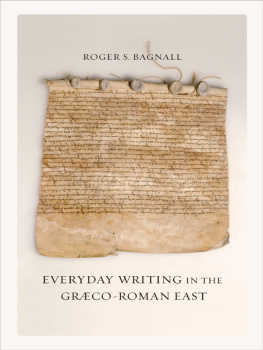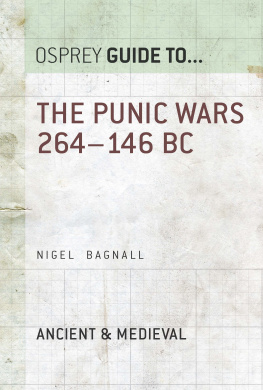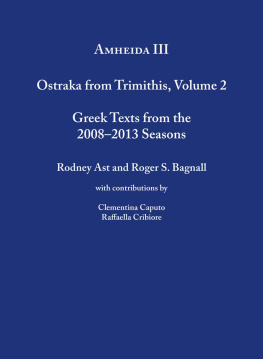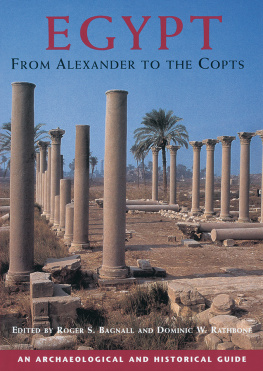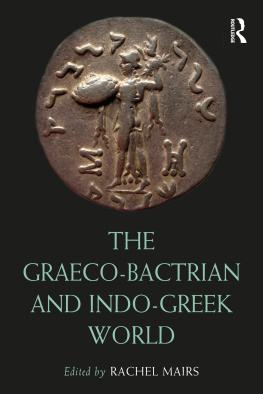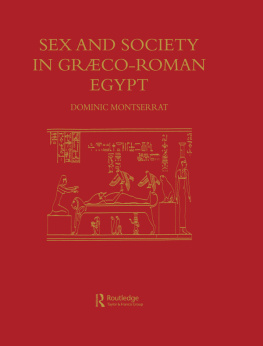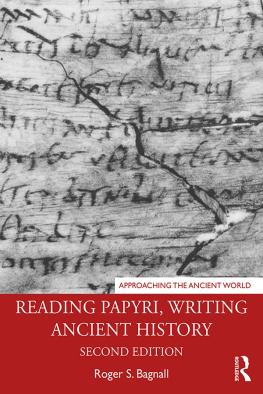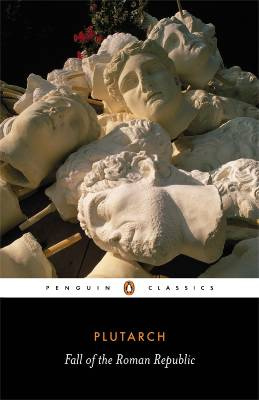Bagnall - Everyday Writing in the Graeco-Roman East
Here you can read online Bagnall - Everyday Writing in the Graeco-Roman East full text of the book (entire story) in english for free. Download pdf and epub, get meaning, cover and reviews about this ebook. City: London;Berkeley;Los Angeles, year: 2011, publisher: University of California Press, genre: Religion. Description of the work, (preface) as well as reviews are available. Best literature library LitArk.com created for fans of good reading and offers a wide selection of genres:
Romance novel
Science fiction
Adventure
Detective
Science
History
Home and family
Prose
Art
Politics
Computer
Non-fiction
Religion
Business
Children
Humor
Choose a favorite category and find really read worthwhile books. Enjoy immersion in the world of imagination, feel the emotions of the characters or learn something new for yourself, make an fascinating discovery.
Everyday Writing in the Graeco-Roman East: summary, description and annotation
We offer to read an annotation, description, summary or preface (depends on what the author of the book "Everyday Writing in the Graeco-Roman East" wrote himself). If you haven't found the necessary information about the book — write in the comments, we will try to find it.
Bagnall: author's other books
Who wrote Everyday Writing in the Graeco-Roman East? Find out the surname, the name of the author of the book and a list of all author's works by series.
Everyday Writing in the Graeco-Roman East — read online for free the complete book (whole text) full work
Below is the text of the book, divided by pages. System saving the place of the last page read, allows you to conveniently read the book "Everyday Writing in the Graeco-Roman East" online for free, without having to search again every time where you left off. Put a bookmark, and you can go to the page where you finished reading at any time.
Font size:
Interval:
Bookmark:


In honor of beloved Virgil
O degli altri poeti onore e lume
Dante, Inferno
The publisher gratefully acknowledges the generous
contributions to this book provided by the Classical
Literature Endowment Fund of the University of California
Press Foundation, which is supported by a major gift from
Joan Palevsky, and by the Jane K. Sather Professorship in
Classical Literature Fund.

SATHER CLASSICAL LECTURES
Volume Sixty-Nine
Everyday Writing in the Graeco-Roman East
Everyday Writing in
the Graeco-Roman East
Roger S. Bagnall

UNIVERSITY OF CALIFORNIA PRESS
BerkeleyLos AngelesLondon
University of California Press, one of the most distinguished university presses in the United States, enriches lives around the world by advancing scholarship in the humanities, social sciences, and natural sciences. Its activities are supported by the UC Press Foundation and by philanthropic contributions from individuals and institutions. For more information, visit www.ucpress.edu.
University of California Press
Berkeley and Los Angeles, California
University of California Press, Ltd.
London, England
2011 by The Regents of the University of California
Library of Congress Cataloging-in-Publication Data
Bagnall, Roger S.
Everyday writing in the Graeco-Roman East / Roger S.
Bagnall.
p. cm.(Sather classical lectures ; v. 69)
Includes bibliographical references and index.
ISBN 978-0-520-26702-2 (cloth : alk. paper)
1. Written communicationEgyptHistory.
2. Written communicationMiddle EastHistory.
3. Manuscripts, Greek (Papyri)Egypt. 4. Graffiti
History. 5. Ostraka. 6. Coptic inscriptionsEgypt.
7. Syriac languageTexts. I. Title.
P211.3.E3B34 2011
302.2'24409394 2 22 2010023442
Manufactured in the United States of America
19 18 17 16 15 14 13 12 11
10 9 8 7 6 5 4 3 2 1
This book is printed on Natures Book, which contains
50% post-consumer waste and meets the minimum
requirements of ANSI/NISO Z 39.48-1992 (R 1997)
(Permanence of Paper).
FIGURES
TABLES
GRAPHS
Preface
The chapters of this book were, in somewhat different form, the ninety-second series of Sather Classical Lectures at the University of California, Berkeley. It is no doubt a restatement of the obvious to say that it is a great honor to be invited to deliver the Sather Lectures. But it is, on any reckoning, the greatest honor that an American classical scholar can hope to receive, and I am grateful to the Department of Classics at Berkeley for their confidence in inviting me. It was also an uncommonly great pleasure for me to be able to spend the fall semester of 2005 in Berkeley and in that department, and I am grateful to all those members of the University who made our semester there such a pleasure.
But it was not merely because Berkeley is a lovely city and the University of California a great and hospitable department and university that it was a memorable stay. The Bay Area was also my home for a dozen years, the years of my elementary and secondary education in the public schools of California. The semester in Berkeley was my first extended stay by the Bay since I went east to university and my parents soon after moved north and then east, now more than forty years ago.
The first of my lectures brought happy reminiscences, for in the audience was one of my best teachers from that era, Christina Gillis, who, before her leadership role in the Townsend Humanities Center at Berkeley, much earlier in her career was my tenth-grade English teacher at Los Altos High School. I was above all pleased that my parents, Roger and Peggy Bagnall, could come back to California to be present for this occasion. Few scholars in ancient disciplines can have enjoyed from the very first the kind of unconditional parental support for their interests that I did from childhood on.
The antecedents of this book go back long before the lectures in the fall of 2005. Some of the topics discussed here make a first appearance, in much briefer form, in Reading Papyri, Writing Ancient History (Bag-nall 1995), and I was already thinking of a more extended treatment then (as the remarks on p. viii of that book suggest). I had in fact intended to pursue the subject further during 1995/6, when I was the Fowler Hamilton Visiting Fellow at Christ Church, Oxford, but other, unanticipated projects intervened, of the present book owe their origins to those lectures. I am grateful to my hosts in Cambridge for their invitation, as well as their dogged attention through some difficult passages, stimulating questions, and unflagging hospitality.
In the revision of the text of this book, I have been fortunate to have the help of Eduard Iricinschi as research assistant, particularly in updating and checking the statistical information about papyri and ostraca used throughout the following chapters. And the availability of two databases, Alain Delattre's Brussels Coptic Database and Mark Depauw's Demotic and Abnormal Hieratic Texts, has allowed me to add statistics for texts in Egyptian scripts unavailable at the time of the lectures. I am grateful to all.
Roger S. Bagnall
July, 2009
P.Oxy.Census and P.Kellis IV (the Kellis Agricultural Account Book) were the interlopers in question. The latter, of course, led eventually to my launching an excavation in the Dakhla Oasis, delaying the writing of this book still further.
The study of the ancient Greek and Roman world has, like every other discipline in the humanities, been transformed over the course of a generation by a host of new approaches and theoretical perspectives. Although these vary greatly in origins and nature, many share an important characteristic: they seek to denaturalize antiquity for us. That is, they try to dispel the comfortable assumption that the ancient world and its inhabitants were more or less like the modern world and like us. They aim instead to push us toward recognizing fundamental chasms between our outlook and practices and those of the people we study. An ancient historian of a social and economic bent may think, for example, of the debate touched off by Moses Finley's celebrated 1972 Sather Lectures, The Ancient Economy (Berkeley 1973), which rejected what Finley saw as mistaken economic modernism in earlier historians. Paradoxically, perhaps, the effect of even something itself so modern as gender studies has been similar, in calling us to recognize that the Greeks and Romans thought about sex and gender in ways very different from ours.
Our thinking about the place occupied in ancient societies by the technology of writing and its products has undergone an analogous change, no less dramatic than these if perhaps less remarked. Given the fundamental place that words and writing have always occupied in classical philology, in fact, the results of challenges to the naturalness of the written word as we have experienced it in the last two centuries are in many respects central to contemporary conceptions of our discipline. As with
The Hellenistic and Roman periods have not suffered from quite such a schematic approach, in part because the available evidence has been more extensive; where for classical Greece the debate still depends heavily on analysis of the statements and assumptions of ancient authors, for later periods we have far more surviving original witnesses in the form of inscriptions, papyri, tablets, ostraca, and graffiti. Here also, however, the debate has gone through an analogous evolution, one strongly marked by the relatively skeptical or minimalist stance on literacy rates taken by William Harris in his
Font size:
Interval:
Bookmark:
Similar books «Everyday Writing in the Graeco-Roman East»
Look at similar books to Everyday Writing in the Graeco-Roman East. We have selected literature similar in name and meaning in the hope of providing readers with more options to find new, interesting, not yet read works.
Discussion, reviews of the book Everyday Writing in the Graeco-Roman East and just readers' own opinions. Leave your comments, write what you think about the work, its meaning or the main characters. Specify what exactly you liked and what you didn't like, and why you think so.

